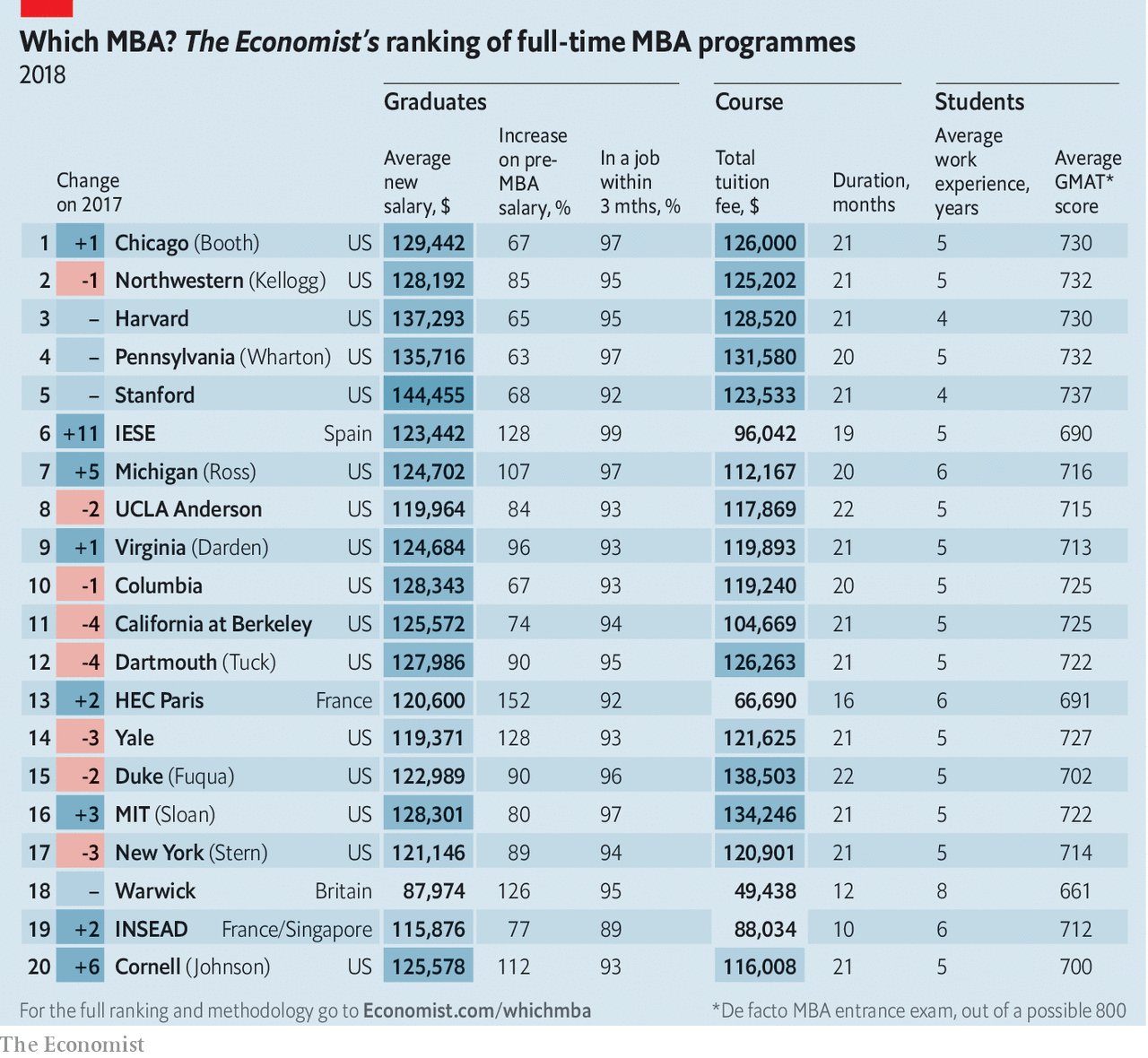In today’s competitive business landscape, the pursuit of an MBA has become an increasingly sought-after path towards professional advancement. With a plethora of MBA programs available worldwide, the task of identifying the most prestigious and transformative ones can be daunting. This article aims to shed light on the crème de la crème of global MBA programs, offering insights into their esteemed reputations, rigorous curricula, and unparalleled alumni networks. By delving into the intricacies that set these programs apart, we will uncover the pivotal factors that shape their prestige and value.
The Top MBA Programs in the World: A Guide to the Most Prestigious
Global Rankings and Reputation
The most prestigious MBA programs are consistently ranked highly in global surveys. These rankings consider factors such as:
Academic reputation: The quality of faculty, research, and teaching.
Career outcomes: The success of graduates in finding high-paying jobs at top companies.
Student diversity: The representation of different backgrounds and nationalities in the student body.
Innovation and impact: The program’s contributions to the business world through research, entrepreneurship, and social impact.
Program Features and Specializations
Prestigious MBA programs offer a range of specializations and unique features that attract top candidates:
World-class faculty: Leading experts in their fields who bring real-world experience to the classroom.
Rigorous curriculum: A challenging and comprehensive curriculum that covers core business concepts and cutting-edge trends.
Global focus: Opportunities for international study, internships, and networking events.
Entrepreneurship support: Resources and mentorship for aspiring entrepreneurs.
Leadership development: Programs that help students develop their leadership skills and personal brand.
Career Opportunities and Alumni Network
Graduates of top MBA programs have access to a wide range of career opportunities and a strong alumni network:
High-paying jobs: Top companies recruit heavily from these programs, offering competitive salaries and fast-track career paths.
Leadership positions: Graduates are well-equipped to take on leadership roles in various industries.
Strong alumni network: A global community of successful professionals who offer mentorship and career support.
Unlocking the Gates to Global Leadership: Top MBA Programs for Aspiring Executives
Global Recognition and Industry Impact
This section will explore the reputation and influence these MBA programs have on the global business landscape. It will discuss factors like employer preference, alumni network strength, and contributions to innovation and research.
Academic Excellence and Rigorous Curriculum
This section will delve into the academic standards, teaching methodologies, and curriculum design of these prestigious programs. It will analyze how they foster critical thinking, problem-solving, and leadership skills in their students.
Diversity and Inclusivity
This section will examine the diversity of the student body, faculty, and curriculum in these programs. It will discuss their efforts to promote inclusivity and create a welcoming environment for students from all backgrounds.
Career Advancement and ROI
This section will focus on the career outcomes of graduates from these programs, including average starting salaries, job placement rates, and industry-specific career paths. It will also discuss the return on investment for pursuing an MBA from these institutions.
Beyond the Classroom: Experiential Learning and Networking
This section will highlight the extracurricular activities, internships, and networking opportunities offered by these MBA programs. It will discuss how these experiences contribute to personal and professional development.
Frequent questions
What criteria are used to determine the prestige of an MBA program?
Several factors contribute to the prestige of an MBA program. Here are some of the most important:
- Reputation: This is often measured by rankings from publications like the Financial Times, The Economist, and U.S. News & World Report. These rankings take into account factors such as faculty quality, research output, alumni success, and employer satisfaction.
- Selectivity: Highly prestigious programs have very low acceptance rates, meaning they only admit the most qualified applicants. This selectivity is a testament to the program’s rigorous academic standards and high demand.
- Faculty: Top MBA programs boast renowned professors with extensive experience in their respective fields. These faculty members are often leaders in their industries and contribute significantly to academic research.
- Alumni Network: A strong alumni network is crucial for career advancement. Prestigious programs have alumni who have achieved notable success in various industries, providing invaluable connections and mentorship opportunities.
- Career Outcomes: Top MBA programs boast impressive career placement statistics, with graduates securing high-paying positions in leading organizations worldwide. These outcomes reflect the program’s ability to prepare graduates for demanding roles.
- Location: The location of an MBA program can also influence its prestige. Programs located in major business hubs with a strong concentration of companies and industries offer access to valuable resources and opportunities.
What are some of the most prestigious MBA programs in the world?
There are many highly regarded MBA programs worldwide, but some consistently rank among the top tier. These include:
- Harvard Business School (United States)
- Stanford Graduate School of Business (United States)
- Wharton School of the University of Pennsylvania (United States)
- University of Chicago Booth School of Business (United States)
- MIT Sloan School of Management (United States)
- INSEAD (France and Singapore)
- London Business School (United Kingdom)
- University of Oxford Said Business School (United Kingdom)
- University of Cambridge Judge Business School (United Kingdom)
- IMD (Switzerland)
It’s important to note that prestige is subjective and can vary depending on individual preferences and career goals. The best program for you will depend on your specific interests and aspirations.
What are the benefits of attending a prestigious MBA program?
Attending a prestigious MBA program can offer numerous advantages, including:
- Enhanced career prospects: Graduates from top programs are highly sought after by employers worldwide, leading to increased job opportunities and higher salaries.
- Stronger network: Access to a global network of influential alumni and faculty members can open doors to valuable connections and mentorship opportunities.
- Increased credibility: An MBA from a prestigious institution adds credibility to your resume and strengthens your competitive edge in the job market.
- Rigorous academic experience: Top MBA programs provide a challenging and intellectually stimulating environment, allowing you to develop critical thinking, problem-solving, and analytical skills.
- Personal growth: The demanding curriculum and diverse cohort of classmates can foster personal growth, leadership development, and a broader understanding of the business world.
These benefits can significantly contribute to career success and personal fulfillment.
What should I consider when choosing an MBA program?
When selecting an MBA program, it’s crucial to consider factors beyond prestige. These include:
- Your career goals: What industry are you interested in? What type of role are you seeking? The program’s specializations and career services should align with your aspirations.
- Program curriculum: Does the program offer courses relevant to your interests and industry? Look for a curriculum that provides a strong foundation in core business concepts and elective options in your area of focus.
- Faculty expertise: Research the faculty’s credentials, research interests, and industry experience. Look for professors who are active in their fields and can offer valuable insights.
- Location and culture: Consider the program’s location and the environment it offers. Do you prefer a bustling city or a more relaxed setting? What is the program’s culture like? Are you comfortable with the community and the school’s values?
- Cost and financing: Evaluate the program’s tuition fees and consider your financing options. Some programs offer scholarships and financial aid, so explore those possibilities.
- Program format: Do you prefer a full-time or part-time program? Are there online or blended options available?
By carefully considering these factors, you can make an informed decision that best aligns with your needs and goals.












